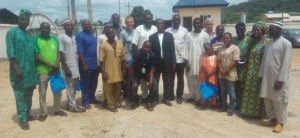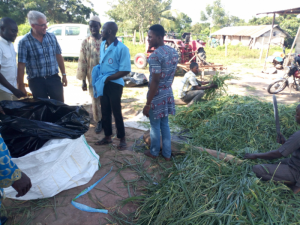Bles Dairies Consultancy, in cooperation with IFDC and Wageningen University and Research is carrying out a Dairy Development Project (DDP) in Nigeria for FrieslandCampina. Dairy farming in Nigeria is challenging due to poorly developed infrastructure, a lack of knowledge, no access to finance, a nomadic way of farming and a focus on meat production. The aim of this DDP is improving the local dairy sector by establishing settled farming. This is accomplished through the implementation of the Dairy Zone model, i.e. a cluster of farmers, including master farms for capacity building, infrastructure and access to finance, feed and extension services. Better infrastructure, water & feed and more services will be available for the farmers through settled farming and this will enable them to improve the quantity and quality of dairy production.
Last February, Bles Dairies expert Alex Nieuwland arrived in Nigeria for long-term. Since then, all partners have fulfilled many organisational tasks, e.g. access to loan, business plans and MoUs for farmers, feed supply, semen and cattle supply, cattle purchase plans, lists of needed machinery etc. All these tasks were needed, before actual field action could be taken.
Access to loan has been found in the so-called Anchor Borrowing scheme, supported by the Nigerian government. In order for farmers to access this loan, a cooperative has been set up. (Photo 1) In due time, feed and milk payments will be processed through this cooperative as well.
Recently, the focus in the field was growing feed for the coming dry season, which starts in December and lasts until April. Farmers need good quality roughage to assure a good milk supply all-year-round. Especially during the dry season, when very little forage will be available and farmers run out of feed, a good supply of roughage is needed.
Currently, some of the crops are ready for harvesting and Bram Wouters, specialist in tropical fodder production and conservation from Wageningen University and Research, assists Alex Nieuwland on this topic. He demonstrated how to store forage by hand, since machines were not yet available. The Brachiaria grass was cut manually and then put in big bags with a plastic liner. Subsequently, the farmer added molasses and compacted the forage with his feet. As soon as the machines arrive, the farmers will place all the bags together, put plastic on top and cover it with dirt, compressing the silage. (Photo 2)
In addition to this, local Fulani farmers in Nigeria believe that the land belongs to everybody, which causes considerable ownership issues. Therefore, the farmers have installed a strong fence preventing other cattle from entering the land and eating the farmers precious feed. Other points of focus are now teachting the farmers a more modern way of farming and trying to let them settle in one place.
Bles Dairies emphasizes the importance of a good feed supply. Having good quality feed during dry season is absolutely important and it also helps upgrading the milk production.
Click here for more information about this project.


